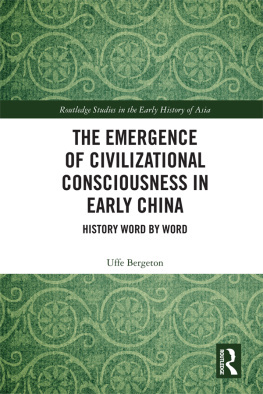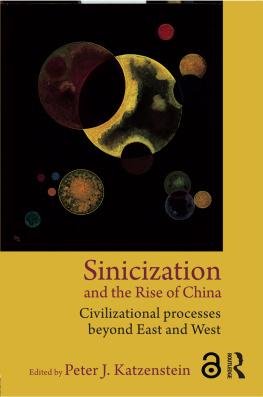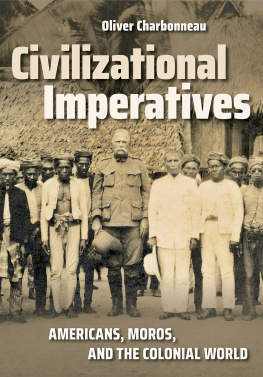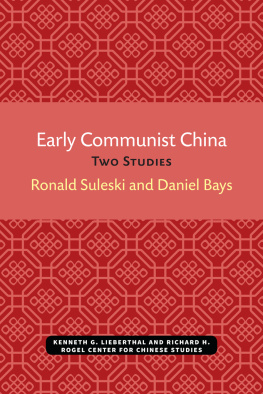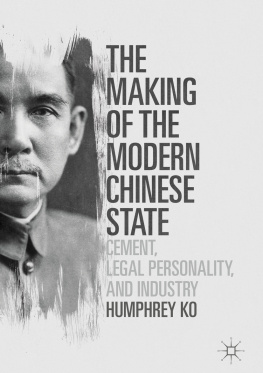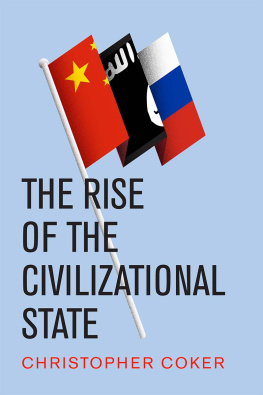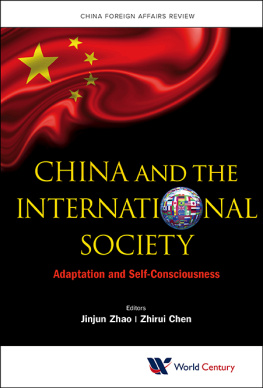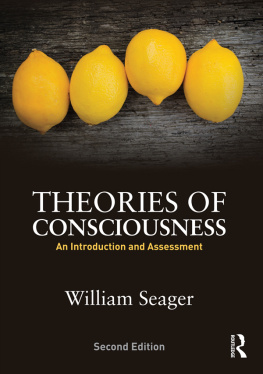The Emergence of Civilizational Consciousness in Early China
This book provides a conceptual history of the emergence of civilizational consciousness in early China. Focusing on how words are used in pre-Qn (before 221 BCE) texts to construct identities and negotiate relationships between a civilized self and uncivilized others, it provides a re-examination of the origins and development of these ideas.
By adopting a novel approach to determining when civilizational consciousness emerged in pre-Qn China, this book analyzes this question in ways that establish a fresh hermeneutical dialogue between Chinese and modern European understandings of civilization. Whereas previous studies have used archaeological data to place its origin somewhere between 3000 BCE and 1000 BCE, this book explores changes in word meanings in texts from the pre-Qn period to reject this view. Instead, this book dates the emergence of civilizational consciousness in China to around 2,500 years ago. In the process, new chronologies of the coining of Old Chinese terms such as customs, barbarians, and the Great ones are proposed, which challenge anachronistic assumptions about these terms in earlier studies.
Examining important Chinese classics, such as the Analects, the Mencius, and the Mz, as well as key historical periods and figures in the context of the concept of civilization, this book will useful to students and scholars of Chinese and Asian history.
Uffe Bergeton is Assistant Professor of Pre-Tang Chinese Language, Culture, and History in the Department of Asian Studies at University of North Carolina at Chapel Hill, USA. Having a background in both linguistics and ancient Chinese history, he specializes in the study of pre-Qn China.
Routledge Studies in the Early History of Asia
Marco Polos China
A Venetian in the realm of Khubilai Khan
Stephen G Haw
The Diary of a Manchu Soldier in Seventeenth-Century China
My service in the army, by Dzengeo
Introduction, Translation and Notes by Nicola Di Cosmo
Past Human Migrations in East Asia
Matching archaeology, linguistics and genetics
Edited by Alicia Sanchez-Mazas, Roger Blench, Malcolm D. Ross, Ilia Peiros and Marie Lin
Rethinking the Prehistory of Japan
Language, genes and civilisation
Ann Kumar
Ancient Chinese Encyclopedia of Technology
Jun Wenren
Women and the Literary World in Early Modern China, 15801700
Daria Berg
Asian Expansions
The historical experiences of polity expansion in Asia
Edited by Geoff Wade
The Emergence of Civilizational Consciousness in Early China
History Word by Word
Uffe Bergeton
The Emergence of Civilizational Consciousness in Early China
History Word by Word
Uffe Bergeton
First published 2019
by Routledge
2 Park Square, Milton Park, Abingdon, Oxon OX14 4RN
and by Routledge
52 Vanderbilt Avenue, New York, NY 10017
Routledge is an imprint of the Taylor & Francis Group, an informa business
2019 Uffe Bergeton
The right of Uffe Bergeton to be identified as author of this work has been asserted by him in accordance with sections 77 and 78 of the Copyright, Designs and Patents Act 1988.
All rights reserved. No part of this book may be reprinted or reproduced or utilised in any form or by any electronic, mechanical, or other means, now known or hereafter invented, including photocopying and recording, or in any information storage or retrieval system, without permission in writing from the publishers.
Trademark notice: Product or corporate names may be trademarks or registered trademarks, and are used only for identification and explanation without intent to infringe.
British Library Cataloguing-in-Publication Data
A catalogue record for this book is available from the British Library
Library of Congress Cataloging-in-Publication Data
A catalog record for this book has been requested
Names: Bergeton, Uffe, author.
Title: The emergence of civilizational consciousness in early China : history word by word / Uffe Bergeton.
Description: New York ; London : Routledge, 2019. | Series: Routledge studies in the early history of Asia ; 10 | Includes bibliographical references and index.
Identifiers: LCCN 2018029325 | ISBN 9781138344099 (hardback) | ISBN 9780429438721 (ebook) | ISBN 9780429797859 (epub) | ISBN 9780429797842 (mobipocket encrypted)
Subjects: LCSH: ChinaCivilizationTo 221 B.C. | Group identityChinaHistoryTo 1500. | Language and cultureChinaHistoryTo 1500. | Chinese languageEtymologyHistoryTo 1500. | Comparative civilization. | EuropeCivilization.
Classification: LCC DS741.65 .B47 2019 | DDC 931dc23
LC record available at https://lccn.loc.gov/2018029325
ISBN: 978-1-138-34409-9 (hbk)
ISBN: 978-0-429-43872-1 (ebk)
Typeset in Times
by Apex CoVantage, LLC
Every effort has been made to contact copyright holders for their permission to reprint material in this book. The publishers would be grateful to hear from any copyright holder who is not here acknowledged and will undertake to rectify any errors or omissions in future editions of this book.
This book is dedicated to
Contents
This book ties together several research projects spanning several years. It could not have been written without the encouragement, feedback, and mentorship of countless people. As a student at University of Southern California, I was fortunate to be introduced to the fascinating world of early China by Bettine Birge, Erica Brindley, George Hayden, and Edward Slingerland. At the University of Michigan, my faculty advisor, William Baxter, safely guided me through the PhD program. Many of the ideas in this book were honed through conversations with him. My debt to him cannot be overstated. I am also grateful to my other faculty mentors and members of my PhD committee, Miranda Brown, Pr Cassel, Christian de Pee, and Norman Yoffee, for their feedback and support. Edward Shaughnessys untiring efforts to help young scholars by organizing paleography workshops at the University of Chicago and archaeology trips to China also have played an important part in my formation as a scholar of early Chinese texts.
My colleagues in the Department of Asian Studies at the University of North Carolina at Chapel Hill have made it possible for me to write this book by creating a truly inspiring work environment. The feedback that I received from two faculty colloquia at which I presented parts of my book manuscript has been of great help. For that I would like to thank Jan Bardsley, Mark Driscoll, Zeina Halabi, Li-Ling Hsiao, Wendan Li, Pamela Lothspeich, Morgan Pitelka, Yaron Schmer, Afroz Taj, Robin Visser, Nadia Yaqub, and Gang Yue.
Numerous people have read and commented on earlier versions of the book manuscript (or parts thereof): Jan Bardsley, William Baxter, Miranda Brown, Pr Cassel, Christian de Pee, Mark Driscoll, Jon Felt, Royce Grubic, Zeina Halabi, Eric Henry, Ash Henson, Jens-Andr Herbener, Maria Khayutina, Pamela Lothspeich, Dirk Meyer, Molly Mullin, Morgan Pitelka, Stacy Moser, Yaron Schmer, Aaron Sonnenschein, Michael Tsin, Ignacio Villagran, Robin Visser, and Norman Yoffee, and Gang Yue.
I am grateful to Harvard Art Museums for granting permission to reprint the high-resolution photograph of the Warring States jade disc (located in the Arthur M. Sackler Museum) in .


